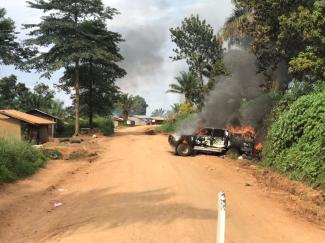DR Congo
In run-up to elections, chaos looms once again in DR Congo

The DRC will go to the polls in 2023. In the run-up to the presidential election, a controversial decision has aggravated an already tense situation. In October 2021, the Congolese Constitutional Court swore in Denis Kadima as the new president of the Independent National Electoral Commission (CENI). He will thus play a decisive role in the conduct of the presidential election.
The CENI chief was supposed to be nominated unanimously by the country’s eight main religious groups. However, Kadima was rejected by both the Catholic Bishops’ Conference (CENCO) and the union of Protestant churches (ECC). The church leaders expressed concerns about his independence. In their eyes, he is the person preferred by incumbent President Tshisekedi. Supporters of the president reportedly used corruption and threats to get Kadima appointed.
Leading policymakers and pro-democracy activists have expressed criticism too. Many are concerned that Tshisekedi loyalists have also been installed as leaders of other important institutions, including the Constitutional Court, which is in charge of certifying election results.
Public protests
Even before Kadima was sworn in, Tshisekedi supporters violently clashed with supporters of opposition leader Martin Fayulu in Kinshasa, the capital city. In November, thousands of Kinshasans demonstrated peacefully against the politicisation of the CENI. In the country’s south-east, however, security forces assaulted demonstrators.
The presidential election of 2018 showed what can happen when electoral bodies are not independent (see my article on www.dandc.eu). Data from the CENI and the Catholic Church’s election observation mission suggest that Martin Fayulu was the real winner of that election. However, the official outcome was different.
Back then, incumbent President Joseph Kabila was not allowed to run again, but he still controlled key institutions. “His” people at CENI and the Constitutional Court allowed him to negotiate a deal with Félix Tshisekedi. Kabila made sure the CENI confirmed him as winner of the election. In return, Kabila kept a majority for his own party in parliament and stayed in control of the security forces.
Tshisekedi ended his coalition with Kabila in early 2021 and appointed a new government. At that point, observers hoped for reform and tougher action on corruption. However, Tshisekedi’s record remains disappointing. In the east of the country, violent conflicts have intensified. Martial law was declared in the provinces of Ituri and North Kivu in March, but the number of violent assaults on civilians has increased nonetheless. Pro-democracy activists have been detained, and three journalists were murdered. They were investigating the impact of martial law and army misconduct. The freedoms of assembly and expression have been curtailed.
The undefined length of the state of emergency, in particular, suggests that the DRC could descend into the kind of chaos seen in the years before the 2018 presidential election. The lack of political will to make timely preparations for the elections is a cause of concern, and so is the lack of clarity about how they will be financed.
Germany’s Federal Government and EU partners have resumed cooperation with the DRC government. They should raise four key demands:
- a transparent electoral calendar,
- transparent election financing,
- admission of independent election monitors and
- respect for the democratic rights of the opposition and civil society in general.
Given that his own rise to power was questionable, President Tshisekedi needs to restore credibility to politics. Free and fair elections are indispensable.
Gesine Ames coordinates the Ecumenical Network for Central Africa (Ökumenisches Netz Zentralafrika – ÖNZ), an alliance of church organisations promoting peace, human rights and development.
office@oenz.de






